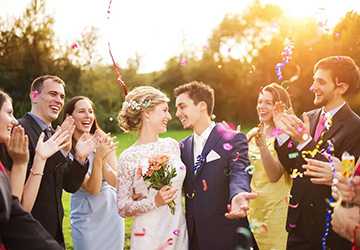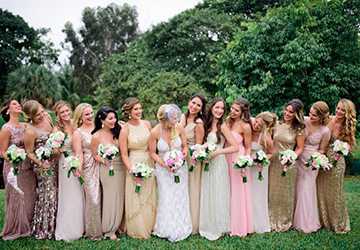Participating in a matrimonial ceremony entails a nuanced appreciation of sartorial decorum, where adherence to Wedding Guest Dress Codes and eschewing specific Colors to Avoid at Weddings are paramount. This guide elucidates the subtleties of Wedding Fashion Etiquette, furnishing you with refined insights to ensure your attire is decorous and distinguished.
Deciphering Wedding Guest Dress Codes
Comprehending the Wedding Guest Dress Codes is essential for curating an ensemble that resonates with the event's ambience and theme. These protocols can range from strictly formal to more relaxed beachside attire, each demanding a unique approach to fashion. An integral aspect of this understanding is recognizing traditionally inappropriate hues for such gatherings.
Traditionally Excluded Colors at Weddings
- White: Conventionally reserved for the bride, wearing white is considered a significant faux pas, as it may divert attention from her.

- Black: Perceived as too mournful for matrimonial festivities, particularly those held during daylight, black should be reserved for evening events or when stipulated by the dress code.
- Red: Its striking vibrancy can be overpowering and potentially upstage the bride, making it a colour best avoided by guests.
Mastering Wedding Fashion Etiquette
Navigating Wedding Fashion Etiquette involves understanding the event's cultural, social, and individual expectations. Employ these sophisticated strategies to ensure your outfit aligns with these unspoken norms:
- Seek Clarification: If the dress code is unclear, it is prudent to inquire, as this demonstrates respect and consideration for the hosts' preferences.
- Adapt to Venue and Time: Tailor your colour choices to the locale and timing of the event, opting for lighter shades for daytime or outdoor settings and more subdued, richer tones for evening affairs.
Strategic Color Selection for Weddings
Deliberate colour choice is crucial:
- Seasonal Sensitivity: Opt for hues that resonate with the season—gentle pastels for spring or rich, warm colours for autumn.
- Synchronicity with Wedding Palette: To create visual harmony, ensure your attire complements the wedding's colour scheme, typically indicated in the invitation.
Evading Fashion Missteps at Weddings
It is vital to consider more than just the Colors to Avoid at Weddings; the overall composition of your attire is equally important. Consider these refined tips to enhance your wedding guest attire:
- Subtle Sophistication: Aim for an elegant ensemble, avoiding overly lavish or ornate outfits that could detract from the event's decorum.
- Judicious Accessorizing: Select accessories that accentuate rather than dominate your outfit, maintaining a tasteful balance that honours the ceremony's solemnity.
Discerning the Nuances of Color Symbolism
Exploring the intricate symbolism associated with specific colours offers profound insights into why certain hues might be inappropriate for matrimonial celebrations. A deeper appreciation of these symbolic values can guide attendees in choosing attire that respects the couple's cultural values and personal aesthetics.
Symbolic Colors and Their Esoteric Meanings
- Ivory and Champagne: Although less stark than pure white, these subtle tones might still echo bridal wear and should be selected with discretion to avoid any implication of rivalry with the bride.
- Bright Neon Colors: Such vivid colours can be assertively disruptive in a solemn or traditionally styled ceremony, potentially undermining the event's visual harmony.
Leveraging Color Psychology in Wedding Attire
The application of colour psychology can profoundly influence the ambience of an event. Opting for attire that fosters a friendly atmosphere enhances the overall experience and aligns with the occasion's celebratory spirit.
Colors that Foster a Harmonious Environment
- Soft Blues and Greens: These hues are celebrated for their tranquil effects, contributing to a serene and inviting atmosphere at the wedding.
- Rich Purples and Blues Symbolize nobility and dignity, so these colours can add a layer of regal elegance without detracting from the central figures of the wedding.
Integrating Cultural Sensitivity into Color Choice
Acknowledging the cultural significance of specific colours is critical to avoiding faux pas at ethnically diverse celebrations. This cultural consciousness is vital where colour holds profound symbolic or traditional value.
Culturally Sensitive Color Considerations
- Avoiding Red in Specific Cultures: In several Asian traditions, red is customarily worn by the bride and, thus, should generally be avoided by guests to honour these cultural norms.
- Black and Mourning: Traditionally, in Western contexts, black has been linked with mourning and thus deemed unsuitable for festive occasions, though this is slowly evolving.
Ensuring Appropriate Attire for Themed Weddings
Adhering to the theme of a wedding while maintaining Wedding Fashion Etiquette can be an engaging yet challenging endeavour. It requires a delicate balance between creative expression and the observance of the event's prescribed attire guidelines.
Adapting to Thematic Elements
- Vintage Themes: For such themes, selecting muted, antiquated hues like dusty rose or soft beige can evoke a sense of historical elegance without infringing on the bridal party's chosen colours.

- Beach Themes: Opt for lightweight, breezy fabrics in cool shades such as turquoise or seafoam green, which mirror the natural setting's aesthetics.
Accentuating Tactful Elegance in Matrimonial Settings
Elegance at a wedding is not just about dressing appropriately; it's about understanding the subtle interplay between personal style and the event's overarching ethos. Attire that aligns seamlessly with the celebration's mood and style underscores a guest's respect and tactfulness.
Selecting Attire That Enhances Event Aesthetics
- Muted Metallics: Silver, bronze, or muted gold can add a touch of understated glamour to your ensemble without competing with the wedding's focal points.
- Pastel Undertones: Soft lavender, pale mint, or blush are excellent choices that blend well with most wedding palettes, especially in spring and summer weddings.
Embracing the Subtleties of Accessorizing
The right accessories can transform a simple outfit into a wedding-appropriate and refined one. Choosing accessories wisely is as crucial as selecting the outfit, ensuring each piece complements rather than dominates.
Conclusion
Understanding Wedding Guest Dress Codes, avoiding Colors to Avoid at Weddings, and observing Wedding Fashion Etiquette are crucial for any wedding attendee. This adherence not only displays respect for the couple and their significant occasion but also ensures your contribution to the event's aesthetic is harmonious and commendable. With these guidelines, your fashion choices will manifest with thoughtful deliberation and cultural understanding, ensuring your presence is appropriate and valued.
-
When to Transition from Puppy Food to Adult Dog Food
The transition from puppy food to adult dog food is climacteric for their maturation and well-being. As canines age, their dietary requirements transform, and the caloric and protein-packed puppy sustenance that was once advantageous may turn superfluous, potentially resulting in health complications such as adiposity. Conscientious pet owners must discern the appropriate moment for this transition to ensure optimal health outcomes for their furry companions. This detailed exposition elucidates the critical timing and considerations in transitioning a puppy to adult dog food.
-
Flavor Journeys: Exploring International Cuisine
The world is a vast tapestry of tastes, textures, and traditions. For the ardent food lover, there's yet to experience quite like savoring the world's best dishes from various corners. The very essence of a nation's culture can often be found simmering in its pots and served on its plates. Here's an odyssey through the landscapes of cultural cuisine history, uncovering the secrets behind cooking international meals and why they rank among the world's best dishes.
-
The Top 10 Most Unusual Pet Jobs
Many fascinating career options relate to caring for domesticated brutes and their welfare in unconventional professions. The world of domesticated brute-related employment is bursting with innovation and novelty, from cuddling with therapy brutes to offering fitness regimens for furry friends. This in-depth article explores the top 10 highly uncommon domesticated brute works, sure to capture your interest and give you a new outlook on brute care. Let’s get started.